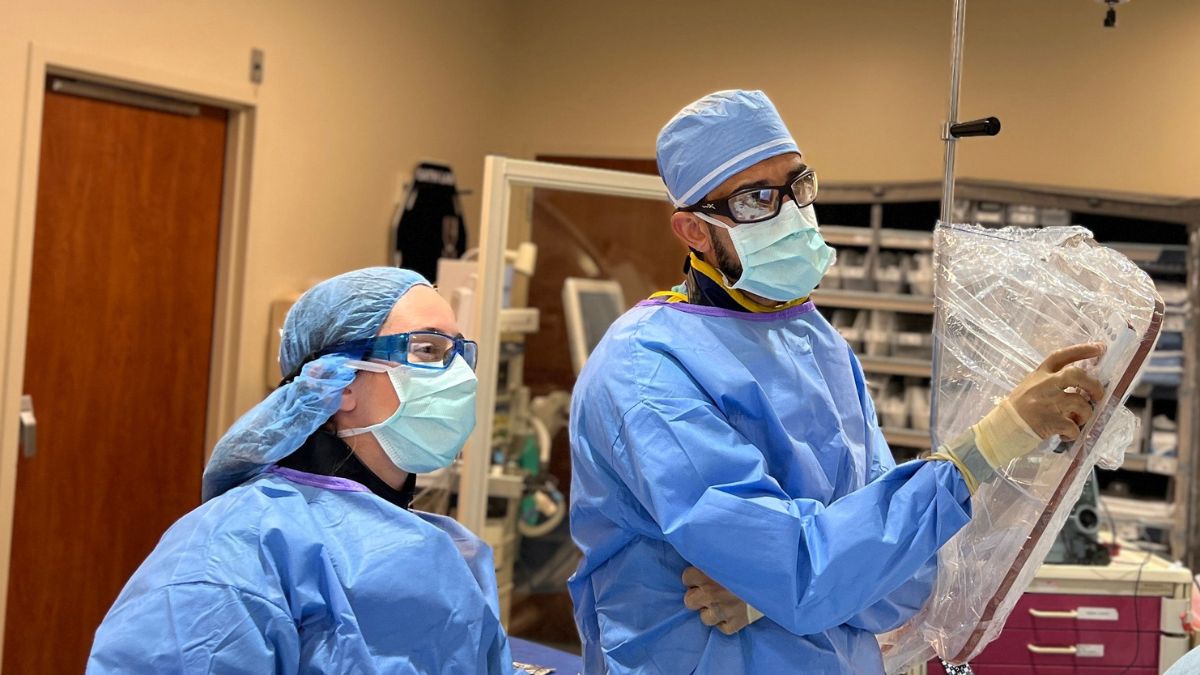Implant Allows Doctors to Monitor Heart Patients Remotely

![]()
Implant Allows Doctors to Monitor Heart Patients Remotely (Palos Heights, IL) —Last spring, 70-year-old Starr Ooms required several hospitalizations for shortness of breath. She thought it might be panic attacks, but when she learned it was congestive heart failure that caused even more anxiety. Her father and grandfather had died from the same condition.
The Oak Forest, Ill. resident is breathing easier now thanks to a remote monitoring system that allows her health care team at the Northwestern Medicine Bluhm Cardiovascular Institute to keep an eye on her vital statistics every day.
Ooms was among the first patients at Northwestern Medicine Palos Hospital to undergo a procedure to implant a CardioMEMSTM device. The implant allows remote monitoring of pulmonary artery pressures without any batteries or wires. Elevation of pulmonary artery pressure can be an early indicator of worsening heart failure.
“Traditionally, we have relied on factors such as patient weight, blood pressures, physical exam findings and symptoms to detect worsening heart failure. Unfortunately, relying on these markers leaves little time to respond before hospitalization is necessary and are often delayed in presentation,” said Majed Afana, MD, interventional cardiologist at Northwestern Medicine Palos Hospital. “The CardioMEMS can detect early changes that can often be treated through simple adjustments of medications without requiring the patient to come in for a visit and may help prevent recurrent hospitalizations.”
The paperclip-sized device is implanted in the pulmonary artery during a minimally invasive procedure. Through a pinpoint incision in the groin, a catheter carrying the CardioMEMS sensor is guided through the blood vessels and up to the pulmonary artery. Most people go home the same day as the procedure.
Following the procedure, the patient receives a special pillow that sends readings from the CardioMEMS sensor. The patient must lie down on the pillow for just a few seconds each day. The sensor sends the readings to a team of physicians and advanced practice nurses to review.
“Before my diagnosis I found myself gasping for breath. It gives me peace of mind to know my numbers,” said Ooms. “I know what to do if my number escalates and I have a team watching over me. I haven’t required a hospitalization since undergoing the procedure.”
In patients with congestive heart failure, the heart does not pump blood as well as it should. When this occurs, fluid can back up into the lungs and other parts of the body. This can cause symptoms such as swelling and shortness of breath.
Through remote monitoring, the clinical team can detect changes up to 30 days before the patient would experience symptoms and take proactive action to protect the patient’s health and prevent hospitalization.
“Heart failure is a debilitating disease requiring comprehensive management, including carefully chosen medications. If left unchecked, heart failure can lead to the failure of other vital organs,” said R. Kannan Mutharasan, MD, medical director of Northwestern Medicine Bluhm Cardiovascular Institute at Palos Hospital. “With CardioMEMS monitoring, we can reduce heart failure readmissions and improve the quality of life of our heart failure patients.”
Previously, local patients had to travel to Northwestern Memorial Hospital or Northwestern Medicine Central DuPage Hospital for the procedure.
More than five million Americans are living with heart failure. The Center for Heart Failure is one of six niche centers within the Northwestern Medicine Bluhm Cardiovascular Institute, a nationally recognized healthcare destination for those requiring highly specialized care.
To learn more about cardiovascular services at Northwestern Medicine, visit nm.org/heart.
Implant Allows Doctors to Monitor Heart Patients Remotely








Responses